
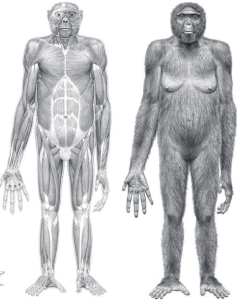
Ardi - another step in getting closer to our ancestors
The other day I was having a conversation, more of a discussion with a good friend of mine who is a self proclaimed atheist. The discussion started with the allusion to the discovery of “Ardi” (Ardipithecus) and how it sheds more light into our true ancestors, and gradually devolved into an interesting conversation around science vs religion. I concurred completely with my friend that there is only one way that theories have to be reviewed and hypotheses validated, through scientific proof. My friend’s argument was clearly defined. “There is no place for a logical and scientific mind to accept anything that is not proven beyond a reasonable doubt. In other words, without a concrete proof of existence in the concept of God preached by a religion, why would any person believe in such a concept? We don’t allow such vagaries in authentication of facts and truths from theories made out of thin air for anything else, so why should we accept these assumptions just because they have been preached over the years, or written down in some scriptures by wise old sages thousands of years ago.” We had no disagreement there, because I respect this approach and without science, we as a species would still be living in the age of conviction of witchcraft spells, blind superstition and human sacrifices. “Thank God, no pun intended,” my friend said, “we are better than that”.
Where I tend to deviate from this thought process is in the self-exploration of human beings for what science can perhaps never explain and never meant to explain. Science gives us a lot of great and fascinating information that explains who we are and how we are constructed and how we behave and how we interact with the rest of the Universe, what with quantum physics and behavior of sub-atomic particles, with Darwin’s principles of evolution and the ongoing quest for mapping the ancestors of different species to distant life forms. All of this is valuable to help us pull away from being devotees of harmful superstition and lead a better quality of life as a species, but fundamentally, what science will never be able to explain is why does life exist to begin with and why is all this happening? I understand there are scientific postulates for the composition and behavior of Universe, of matter and energy or just energy in different forms including matter, but they still don’t answer the questions around why, only that of how.

Asking the questions around why is part of human inquisitiveness
Atheists, including some great thinkers among those, have long claimed that this question centered around “why” is born out of an egotistical self importance that human beings accrued over lifetime after lifetime of self conceit because we cannot digest the fact that once we are dead, we are dead, and that there is no such thing as a heaven and a paradise in some distant sky tucked away among some puffy clouds presided over by God and his blissful angels, because all of this is made up by humans to make themselves feel important enough that they continue to exist somewhere even after death. Let’s say all of that is exactly that, an imaginary and wonderful world created to make one feel better and there isn’t any truth to it, especially, since none of that has little chance of ever being proven scientifically.
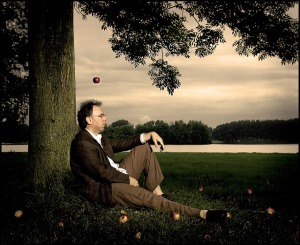
Newton's apple - led to the Universal law of Gravitation, but doesn't address why Gravity exists to begin with.
My question to my friend was how one can completely ignore the personal curiosity of human perception that asks the question “why things happen as they happen” – a dimension that Science doesn’t address and was never meant to address because as we established before, it focuses on answering the questions around how and not why? How can human beings with all that perception and reason ignore this question completely – it is no different than asking the questions around “how”? It isn’t so much about self importance than it is about natural human inquisitiveness. The same curiosity that led Newton to discover Gravity when he saw an apple fall from a tree, if extended to why Gravity exists at all, can only be addressed by personal or philosophical conjecture. This basic difference between how and why life, matter and space happens is where the path forks for me, how being continually answered by Science, and why being left to personal exploration. If you believe in Science, this is just as logical an investigation.
This isn’t a revelation to anyone, but to me, it has always been important to make that distinction and not get the discussions mixed up between scientific facts and philosophical and spiritual examination, because with every new scientific discovery, the same questions surrounding the why continue to persist and maybe only deepen. Science is neither an anathema nor a solution for this quandary, but anytime I hear or read about science and philosophy being pitched against each other, the debate begins to lose sense. From the Big Bang to the String theory, the scientific concepts are all fascinating and eye-opening in an explanation of how things work in the Universe and the wonders behind the constitution of matter, but they will never address why it has to be this way and this question is as central to human perception as those that led to the evolution of science.
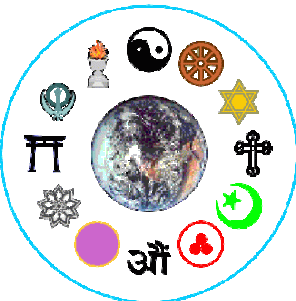
Does organized religion provide the answer?
How does one pursue this question around why? That’s where religion comes in. If the goal of organized religion is anything other than providing a path to self-realization to answers for questions around “why”, then they are being more harmful than beneficial.

Believing in Science and religion - are both a matter of trust?
Here is an argument that I heard someone make for religion once. What if you are not capable of comprehending Einstein’s relativity theory? Does that make you immediately discard Einstein’s famous theory until you are able to really understand it? Don’t you just take the word of your teacher or that group of brainy scientists who you might have never met but who you know have understood the theory and validated its proof? Fact is, you do take their word in the scientific world and with religion, the argument goes, you are being asked to do the same for your path to a greater comprehension and thus the argument ends, it come down to how much trust you have in your religious institution. The unconvincing part of this analogy is the leap of faith that you are asked to make. If you don’t comprehend a scientific fact, you know there are enough people alive and around you to prove it to you. On the other hand, while on the treacherous climb to that unknown comprehension, all that you are asked to use for guidance are words and wisdom written down eons ago by someone or some group who you have never met and worse yet, the so called modern day followers of these prophets and saints are more interested in protecting their turf or increasing the sheep that follow their blind preaching, while the only reason and purpose for the existence of such institutions are long lost, and the only way to get any value out of them is to go to the sources. While it might be awfully tempting to just follow the direction from someone or some group who claim to know the path and the destination, true self exploration of trying to find answers to the questions of why doesn’t have to depend on any religious preaching or on a potential baseless myth that might have perpetuated into a mystical legend.
If you are looking for the answers to the why, and are implicitly open to the somewhat ambiguous and all-encompassing definition of God in general terms, you are not limited by its didactic characterization from various religions, and the definition of an atheist and a theist become a semantic blur, which brings me to these excerpts from Jiddu Krishnamurti, which you are open to review and make your own deductions, for he wouldn’t want it any other way.
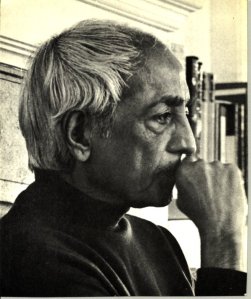
Jiddu Krishnamurti - a great thinker
This short excerpt is from Krishnamurthi’s response in one of his many talks he participated in during his life time (1895 – 1986) where he is explaining the state of higher awareness and his rational for trying to achieve it:
[…….]
Mind cannot think completely, fully, if it is tethered to a belief. It is like an animal that is tied to a post by a string. It does not matter if that string be long or short; it is tied, so that it cannot wander fully, freely, extensively, completely; it can only wander within the length of the string. Surely such wandering is not thinking; it is only moving within a limited circle of a belief. Now, men’s minds are tethered to a belief, and therefore they are incapable of thinking. Most minds have identified themselves to a belief, and therefore their thought is always circumscribed, limited by that belief or ideal; hence the incompleteness of thought. Beliefs separate people. So, if you see that, if you really recognize with your whole being that belief is conditioning thought, then what happens? You become aware that your thought is conditioned, aware that your thought is caught up, tethered to a belief. In the flame of awareness, you will recognize the foolishness, and therefore you are beginning to free the mind from the conditioning, and hence you begin to think completely, fully.
Please experiment with this, and you will see that life is not a process of continual battle, battle against standards as opposed to what you want to do. There is then, neither what you want to do, nor the standard, but right action, without personal identification.
Take another example. You are afraid of what your neighbor might say – a very simple fear. Now, it is not good developing the opposite, which is to say, “I don’t care what the neighbor says, “ and do something in reaction to that opposition. But if you really become aware of why you are afraid of your neighbor, then fear ceases altogether. To discover that “why”, the cause of it, you have to be fully aware in that moment of fear, and then you will see what it is; you are afraid of losing a job, you want to fit into society, and all the rest of it. So, you begin to discover through this process of alertness of mind, this continual awareness; and in that flame the dross of the false standards is burnt away. Then life is not a battle. Then there is nothing to be conquered.
[……]
Where the mind is enslaved, conditioned, there must be conflict, there must be suffering, because, after all thought is like waters of a river. It must be in continual movement. Eternity is that movement. If you condition that free flowing movement of thought, of mind and heart, then you must have conflict and then that conflict must have a remedy and then the process begins; the searching for remedies, the substitutes, and never trying to find out the cause of this conflict. So, through the process of full awareness, you liberate the mind and heart from the hindrances which have been set about them through the environment; and as long as environment is conditioning the mind, as long as the mind has not discovered the true significance of the environment, there must be conflict…
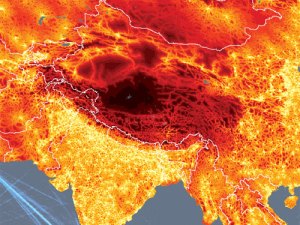
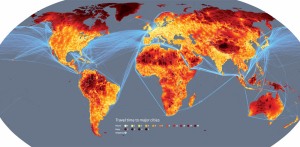







 . > my videos
. > my videos .. > my photos
.. > my photos .. > my poems
.. > my poems .. > my sh. stories
.. > my sh. stories … > my critique
… > my critique … > my travelogue
… > my travelogue …. > my markers
…. > my markers A Dram of Poison – Charlotte Armstrong (1957)
A Dram of Poison – Charlotte Armstrong (1957)